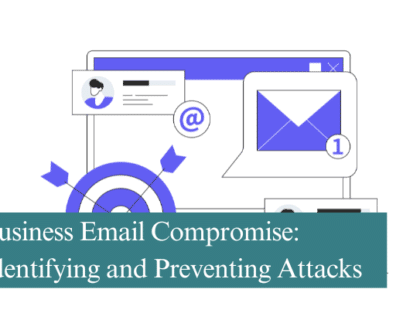
In recent months, the world has been inundated with AI (Artificial Intelligence) tools. The tools are pretty cool, but they can be used by criminals to create more convincing scams.
AI chatbots are used to create text that sounds like a human—it’s very challenging for a human to discern the difference between text generated by AI or a human being. What’s more, the chatbots are able to create tons of text in a matter of minutes, without too much input from a human.
So, it should come as no surprise that criminals are taking advantage of AI tools to make their work more effective.
What is an AI Chatbot?
AI chatbots use artificial intelligence to understand language inputs. They learn by ingesting large amounts of human data, applying algorithms to the data, and using the results to create a purpose.
The more an AI chatbot interacts, the more data it gathers and the more the AI chatbot can do.
How Does an AI Chatbot Work?
AI chatbots, such as ChatGPT, can work on their own using natural language processing and machine learning. NLP combines language rules with language context to interpret what is communicated. This enhances the chatbot’s understanding. Over time, chatbots can develop the ability to recognise verbal cues that help them understand the user’s sentiment, mood, and more.
AI bots that use NLP work on the following basis:
- Through human input (for instance, a human may ask the chatbot a question or to perform a task)
- AI algorithms are applied to the text of a customer’s question
- The AI delivers a response to the customer via text or SMS
The technology responds so quickly and in a way that seems like a human, making it difficult to tell if you’re interacting with a machine or a human. This is the very element that makes AI tools so attractive to criminals.
How Are Criminals Using AI Chatbots?
That’s a great question, and we have some answers for you! Currently, criminals are using AI chatbots in three main ways, including the following:
- Better Phishing Emails
In the past, it was somewhat easy to discern whether an email was a phishing email or not. Some clues that a message was a phishing email included poor spelling and grammar, along with some other indications. The criminals tried to trick the reader into clicking a link to download malware or steal personal data.
Today, criminals are using AI-written text in their phishing emails. The problem is that text generated by AI is very hard for humans to tell whether it’s a phishing email or not. AI chatbots can generate text that’s not filled to overflowing with many mistakes.
What’s more, criminals are using artificial intelligence chatbots to create unique text every time. This makes it more challenging for spam filters to stop these emails, as the messages look legitimate.
- Spreading Misinformation
Criminals are usually very creative individuals. Once they find that AI can be used for nefarious purposes, they can easily find ways to use the tool. One creative use of AI chatbot is to create messages that carry misinformation and disinformation.
While this may not seem like a huge problem for you, it could lead to company employees falling for scams, clicking malware links, or damaging your organisation’s reputation.
All it takes is for a criminal to write a prompt telling the AI chatbot to create text about the CEO of the company having an affair. That’s truly all it takes for the criminal to cause mayhem with your business.
- Creating Malicious Code
Criminals have also learned that AI chatbots can generate computer code. They use the code to create malware.
Many people are against AI chatbots for this reason. However, it’s important to remember that the tools are not responsible for the crimes. It’s the criminals who learn how to use AI to create malware and other malicious code.
Protect Your Company Against AI Chatbot Scams
While these scams are dangerous and alarming, there are some steps your business can take to avoid falling prey to AI chatbot scams.
Educate employees about AI scams: it’s essential to train employees on how to recognise AI scams. For instance, some scams have unusual requests, such as asking for money or sensitive information. Employees should never respond to such messages. Instead, the company needs to set up procedures on how to handle these types of messages, with instructions for how employees should respond.
Implement multi-factor authentication: another way to protect your company against AI chatbot scams is to require multi-factor authentication across all financial transactions, online payments, and to access other sensitive data. This makes it more difficult for anyone within the company to make wire transfers or online payments. Scammers will have a harder time impersonating company executives or other employees.
Use AI-powered security tools: your business may also want to consider using AI-powered cybersecurity tools to detect and prevent AI scams. The tools use machine learning algorithms to analyse patterns and detect anything that seems off or different, which could be an indication of a scam.
Monitor online activity: regularly monitor and watch for any unusual activities, such as unauthorised logins or other attempts to gain access to company data.
Implement a cybersecurity policy: it’s also essential to develop a comprehensive cybersecurity policy that offers best practices for protecting your company from AI scams and other cyber threats. The policy needs to be regularly reviewed and updated, and it should be sent out to all employees.
Summing It Up
AI tools are fascinating and can be extremely useful to your business. However, criminals have found the AI to be just as helpful for generating text to use in cyber crimes. What’s more, the text generated by AI chatbots is so convincing that it seems legitimate.
For these reasons, it’s essential for your business to take steps now to avoid falling prey to scammers who use AI for their own purposes. Follow the guide in this article to create or update your current cybersecurity policy.
If you have any questions about keeping your business safe from AI scammers, reach out to your IT service provider today. They’ll have the advice to help your company stay safe from AI scammers.
Recommended Posts

Are you making the most of your Microsoft 365 licensing?
4th July 2025


